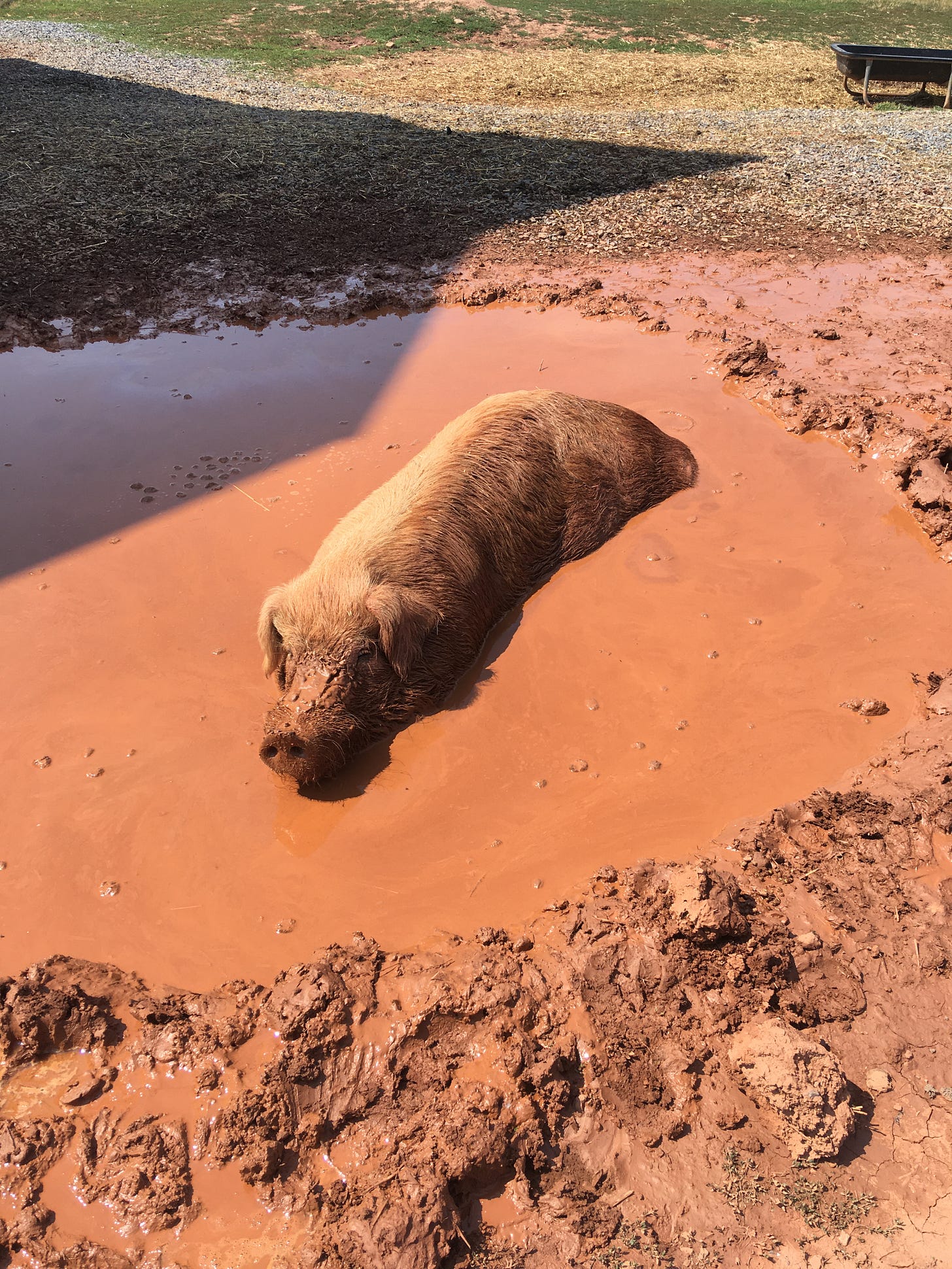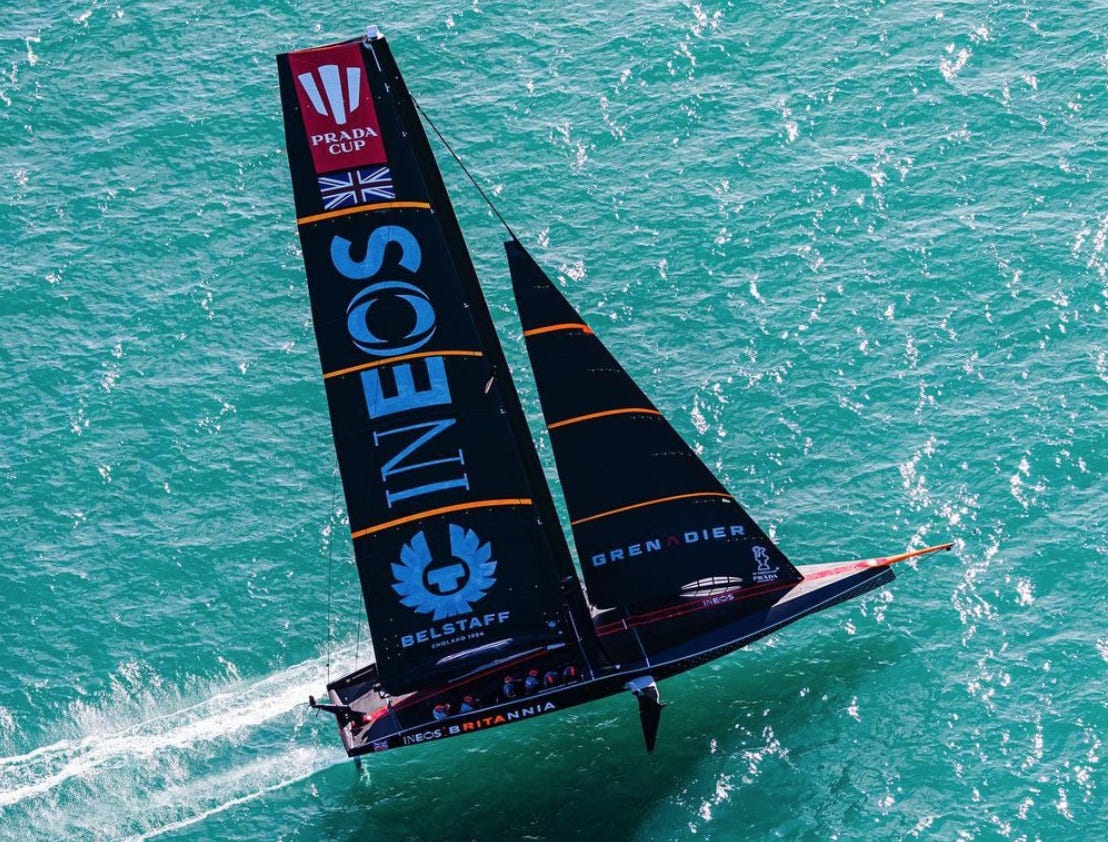I am like a pig in…
Moondust was dropped in the water on Monday, and is sitting at Herrington Harbor North in Deale, MD. I made a quick trip out there to install the batteries (so the bilge pump would work, just in case!), and now have a few final chores to take care of (tune rig; bend on sails, etc) before moving the boat up to Annapolis this Sunday. Right now, the forecast is for slightly chilly temps (50s), but a perfect easy-sailing breeze. May be a chance to break out the new, used asymmetrical and see what I bought (sight unseen).
I’ll be going to Whitehall Marina, which is on Whitehall Creek, just off the Severn River. It is a friendly, old-school, marina, and about a 40 minute run to the various Annapolis race start lines. That time can be used to rig things for racing, reviewing SIs and weather, and getting ready for a race, so it’s not wasted. The difference in cost (versus a marina in Annapolis proper) is at least a new genoa or spinnaker (and more than enough beer for a season or two if you prefer to look at it in those terms).
The real bonus, though, is that the yard is run by Chesapeake Bay racing wizard, John White, who has won all kinds of races in all kinds of boats (often after cutting them up and moving major parts around to sail faster to a given rating). I raced with John a few times on his J-30 about two decades ago, and he is an inexhaustible resource of boat design, and racing knowledge. In fact, a discussion I had with him was partly what inspired me to seek out an asymmetrical. I’ll try to do an interview with him, and post it here, sometime this season. He is a very nice guy and always interesting.
Real sailing starts in a few weeks, so stay tuned. For just a little while longer.
Look Up Adventurer In The Dictionary…:
…and you just might find a picture of Mike Horn. Sailor, polar explorer, Amazon swimmer. All-around badass and Wetass Hall Of Famer. He has done a…lot.
I have followed him with awe and respect for years. And there is a great profile of Horn in Yachting World that is well worth reading:
Mike Horn is not a man you forget easily, yet if you were to name the world’s most famous sailors, it’s unlikely Horn’s name would top the bill. For a man who has, by his own count, sailed 27 times around the planet, this seems something of an oversight.
The ultimate South African tough guy, Horn has a commanding manner and physical presence. This, partially, is what has made him a household name in France, where he presents a reality television show called The Island (similar to the English show with Bear Grylls).
But Mike Horn is far from being a ‘celebrity’ explorer. He has spent a lifetime achieving near-impossible journeys in the wilderness and campaigning against climate change. He has made global headlines over 25 years of adventures, many of which have been spent exploring the limits of ocean crossings, but the sailing element has often been seen as almost an adjunct to the front-page grabbing records and near-death experiences.
So what have you been up to lately?
Good News/Bad News for Sailors:
Thanks to changes from the World Meteorological Organization on hurricanes.
The Good—You’ll be less confused about the name of the hurricane that is about to hit you:
There were a record number of named tropical storms in the Atlantic last year, and some storm-weary residents in hurricane-prone regions were getting the names mixed up, [National Hurricane Center Director Graham] said. Hurricane experts, the WMO announced, will stop using Greek alphabet names after exhausting the “regular” alphabet, which has only happened twice—in 2005 and last year.
Instead, they’ll just go back to the start of the regular alphabet again.
The Bad—Hurricane season is now officially longer:
The WMO’s Hurricane Committee also decided to start issuing its regular hurricane bulletins for the Atlantic on May 15, two weeks earlier than in previous seasons, Graham said. That decision came after discussions about changing the “official” start date of the season from June 1 to May 15—considerations that are continuing amid worrying signs that the hurricane season may be getting longer.
While research into whether the season is expanding is still inconclusive, the 2020 season was the record sixth in a row in which a tropical storm formed before the official start date. Ocean heat is the main fuel for hurricanes, and global warming is driving sea surface temperatures and deep ocean heat to new record levels nearly every year.
Be careful out there.
Can’t Sailing Find Better Sponsors?:
Apologies, just a quick dip back into sailing and sustainability, because a new report calls out the many sports which benefit from carbon-spewing industries. “Sport floats on a sea of sponsorship deals with the major polluters. It makes the crisis worse by normalising high-carbon, polluting lifestyles, and reducing the pressure for climate action,” co-author Andrew Simms told the BBC.
The report details a number of major sailing sponsors whose business models are not good for the climate future.
Pouring sponsorship into major sailing events may be good marketing practice. But it also feels like a form of greenwashing. Which is leading to a movement calling on ad firms to stop working for fossil fuel companies (just like firms eventually turned away from cigarette companies).
Against all this stands a lonely 11th Hour Racing. Which may be a pretty good illustration of how hard it is to find clean sponsorship.
You Gotta Laugh (Or Do You?): Off-topic, but on-target and funny. SNL, with just one more way in which Boomers are screwing everyone else. (And, okay, I am a tail-end Boomer and just got my first jab, so this is on my mind).
Data Worth Noting:
Eight million metric tons of plastic waste enter the oceans every year. This equates to one garbage truck’s worth of plastic being dumped into our oceans every minute. The total weight is the equivalent of 90 aircraft carriers. On top of that, models project that by 2050, there will be more plastic by weight than fish in the oceans.
Plus, the pandemic is driving increases in single-use plastics and take-out food containers, latex gloves, and of course…
All of this stuff is now a source for more plastic and synthetics finding their way into rivers and oceans. (Source)
That’s all for today. If you would like to receive the latest Wetass Chronicles in your inbox when they are published, please subscribe here.









